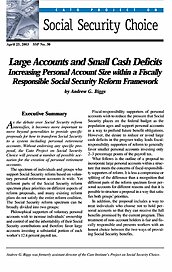As the debate over Social Security reform intensifies, it becomes more important to move beyond generalities to provide specific proposals for how to transform Social Security to a system including personal retirement accounts. Without endorsing any specific proposal, the Cato Project on Social Security Choice will present a number of possible scenarios for the creation of personal retirement accounts.
The spectrum of individuals and groups who support Social Security reform based on voluntary personal retirement accounts is wide. Yet different parts of the Social Security reform spectrum place priorities on different aspects of reform proposals, and many existing reform plans do not satisfy the entire reform coalition. The Social Security reform spectrum can be broadly divided into two groups:
Philosophical supporters of voluntary personal accounts wish to increase individuals’ ownership and control of and the inheritability of their Social Security contributions and therefore favor large accounts investing a substantial portion of each worker’s 12.4 percent payroll tax.
Fiscal-responsibility supporters of personal accounts wish to reduce the pressure that Social Security places on the federal budget as the population ages and support personal accounts as a way to prefund future benefit obligations. However, the desire to reduce or avoid large cash deficits in the program today leads fiscal-responsibility supporters of reform to generally favor smaller personal accounts investing only 2–3 percentage points of the payroll tax.
What follows is the outline of a proposal to incorporate large personal accounts within a structure that meets the concerns of fiscal-responsibility supporters of reform. It is less a compromise or splitting of the difference than a recognition that different parts of the reform spectrum favor personal accounts for different reasons and that it is possible to structure a proposal in a way that satisfies both groups’ priorities.
In addition, the proposal includes a way to treat individuals who choose not to hold personal accounts so that they can receive the full benefits promised by the current program. This treatment of non-account holders is fair and fiscally responsible and presents workers with an honest choice between the two ways of providing Social Security benefits.

This work is licensed under a Creative Commons Attribution-NonCommercial-ShareAlike 4.0 International License.

